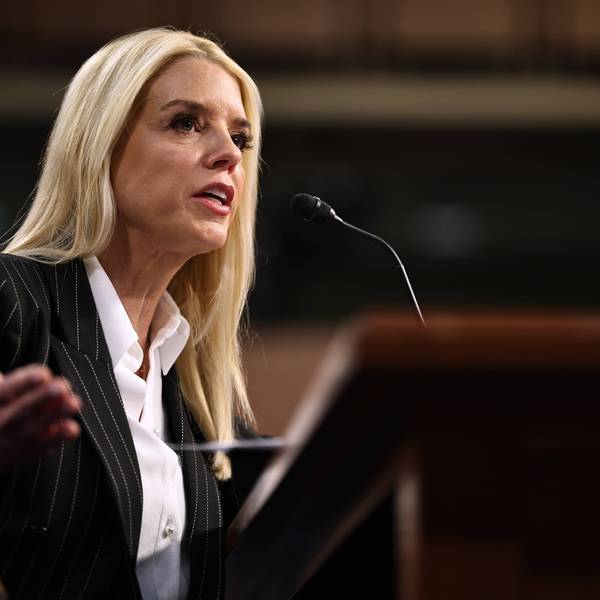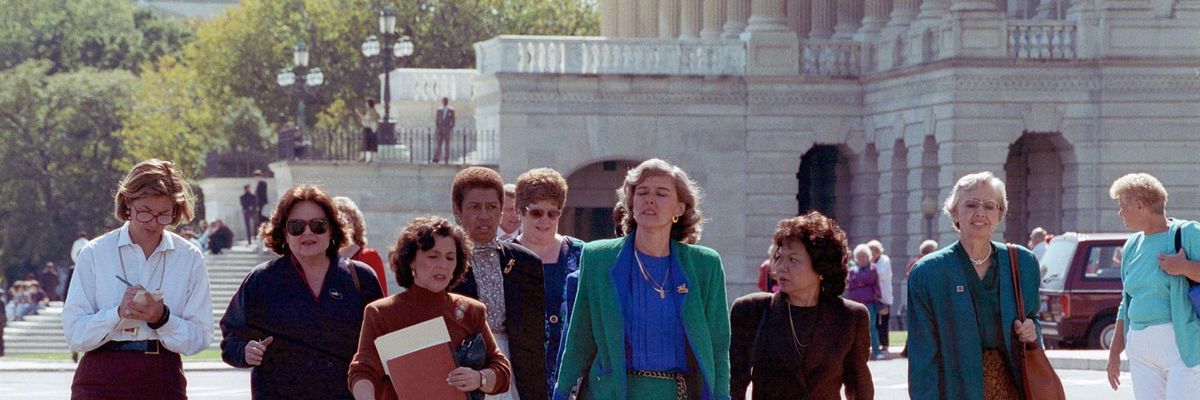On October 8, 1991, six other female members of Congress and I stormed the steps of the U.S. Senate and interrupted the Democratic Senators' weekly caucus lunch, demanding that Professor Anita Hill be given an opportunity to testify during the confirmation hearings of Clarence Thomas about allegations of sexual misconduct.
You might think that a Democratic-controlled Senate and Judiciary Committee would not have required the intercession of six Democratic members of the House of Representatives to give a public airing to the outrageous actions of President George H.W. Bush's Supreme Court nominee. But to think that is a fundamental misunderstanding of the environment at the time.
There were, in 1991, no female members of the Senate Judiciary Committee on either side of the aisle. Thousands of American women -- including more than a few on Capitol Hill -- endured sexual discrimination and harassment at their workplaces in silence (in addition to unequal pay, which continues to this day). And there was a feeling among the men in charge that inappropriate personal or professional actions of a judicial nominee, even one for a lifetime appointment, shouldn't interfere with the progression of his illustrious career.
So here we are again, 27 years later. The similarities between the reactions to Professor Hill's accusations and those of Dr. Christine Blasey Ford, Deborah Ramirez and Julie Swetnick against Judge Brett Kavanaugh have been well documented. And the actions of the Senate leadership and the Senate Judiciary Committee leaders raise questions about exactly what, if anything, the Senate Judiciary Committee learned from its gross mistreatment of Professor Hill.
The answers will have profound implications far outside the nation's capital.
Just days after we marched up the Senate steps, Professor Hill swore to tell the truth and testified before the all-male, all-white Senate Judiciary Committee. I'll never forget watching the blank faces of the men questioning Professor Hill, casting doubt on her credibility and calling into question her motives. The hearings devolved into a shameful discourse that sought to embarrass and cast fault on the accuser. In reality, Professor Hill was on trial that day.
For many, it was captivating television, a real life political thriller. But for too many women in America, experiences like Professor Hill's were all too real.
In 1991, far fewer people, including U.S. Senators of both parties, took seriously the pervasiveness of sexual harassment and abuse of women in our society. Professor Hill's testimony marked a tipping point, changing how we talk about workplace sexual harassment, raising public awareness about its pervasiveness and spurring the "Year of the Woman," when then-record numbers of women ran for and were elected to Congress.
Decades later, it seems increasingly likely that the Senate Judiciary Committee will repeat its catastrophic failures from the Thomas hearings, reportedly hiring an outside prosecutor to conduct a legalistic interrogation of Kavanaugh's alleged victim instead of a Senate hearing.
It's not enough for the committee to prematurely hold a hearing for Judge Kavanaugh and Dr. Blasey Ford to testify in order to set the stage for a quick vote immediate afterwards. It must pause for a thorough FBI investigation of the allegations against Kavanaugh. Absent such an investigation, the nomination process must not proceed.
If the Republican Senate majority could stall on the last Supreme Court nomination for 293 days for political reasons, surely multiple sexual misconduct allegations are a good reason to delay a hearing and a vote on a lifetime appointment to the highest court in the land.
Senators must listen to Dr. Blasey Ford, Ms. Ramirez, Ms. Swetnick and any other women who comes forward without bias or malice, and treat them with the respect Professor Hill was not afforded. So far, they haven't. That is particularly disturbing given that several Republicans have served on the committee since the days of Professor Hill's testimony. For instance, Sen. Orrin Hatch, R-Utah, who accused Professor Hill of basing her testimony on "The Exorcist" and was one of the fiercest defenders of Justice Thomas, has now said that Dr. Blasey Ford may be "mixed up" and confusing Judge Kavanaugh with someone else.
Instead of showing deference or even compassion, Republican Senators on the Judiciary Committee have ignored Dr. Blasey Ford's request for the FBI to re-open its background check investigation of Judge Kavanaugh, and demanded her rushed participation in a Senate hearing to apparently be conducted by a sex crimes prosecutor. (Never mind that she received death threats and was forced to flee her home.) It's no wonder Dr. Blasey Ford apparently remains concerned about testifying on the Republicans' terms.
Only after reviewing the findings of a thorough investigation and hearing testimony from Kavanaugh's accusers should the committee members make a determination about the credibility of the nominee. Only then should the committee consider whether Kavanaugh's nomination should proceed based on his abilities, his judicial record and philosophy and his character.
I oppose Judge Kavanaugh's nomination for policy reasons, but such opposition should have no bearing on how this matter is handled. Whether you believe he would be a good addition to the Supreme Court or not, a full examination of these incidents and the judge's entire background is warranted.
The Senate erred gravely in proceeding with the Thomas nomination given the credible accusations against him, let alone with rushing through the hearings and refusing to hear testimony that supported Professor Hill's accusations. It should not make the same mistake again, thus perpetuating the mistreatment of another generation of women and girls.




